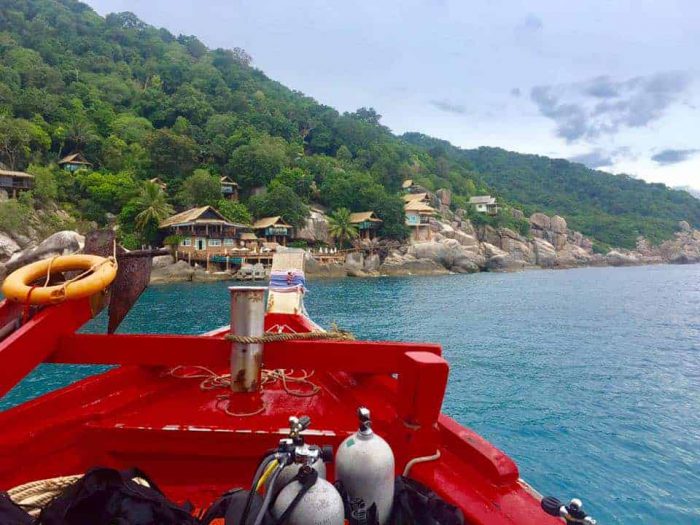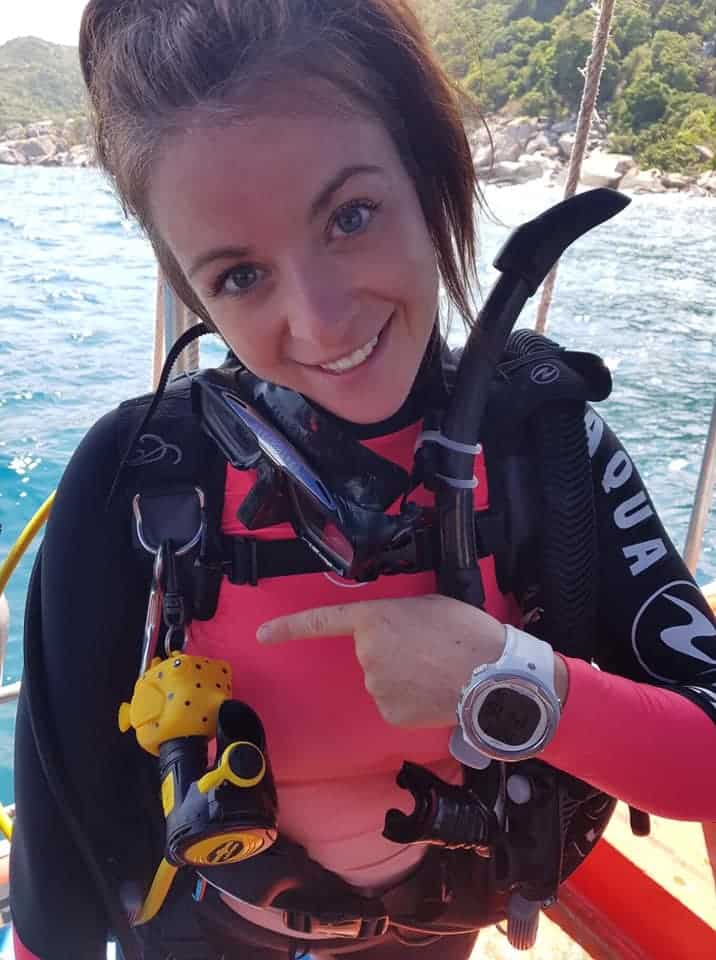If you’re completely new to scuba diving, you may wonder how regular divers manage to put up with spending hours on board a boat on choppy waters without feeling that dreaded motion sickness!
Let me tell you – while your first dive trip or two may be a little shaky, most scuba divers find they do start to feel better with practice – and I can vouch for that! Nontheless, it can be something that hits even the most well versed of boat dwellers, event when you don’t expect it! Based on my own experience – and tips I’ve picked up over the years – here’s everything you need to know about motion sickness while diving.
Table of Contents
What Causes Seasickness?
Although we all tend to think of seasickness being directly linked to being on the water, in actual fact, seasickness is just motion sickness. But what causes seasickness?
As you may know, the inner ear is what controls our balance. Once you are on the water and bobbing up and down with the waves, the confusion between your inner ear, muscles, and what your eyes are seeing sends a stress signal to the brain in which motion sickness occurs. Motion sickness can happen whether you are on rough seas or calmer waves. It can happen on land, too!
Avoiding seasickness, however, is perfectly simple – keep reading!
How Do I Prevent Seasickness During Diving?

Should you find that you often feel unwell on the sea, but are keen on enjoying some sailing, scuba diving, travel out to sea and more, then you will be happy to know that there are plenty of ways of handling the seasickness. Of course, take the below as a handful of ideas – what may work for you may not work for everyone, and the other way around, too!
Take Seasickness Pills
The first and most common way of preventing seasickness is by taking medication before climbing aboard. There are a wide variety of over the counter medications to choose from. Simply ask your pharmacist what they recommend, and keep trying until you find the one that works best for you. However, do remember to look for the non-drowsy kind, especially if you are going diving!
Eat Well Before Diving (2-3 hours)
Be sure to eat some starchy foods and vegetables before you take the sea to keep your stomach feeling full. If you feel hungry or lightheaded, then you are far more likely to feel ill during your trip. However, avoid spicy and greasy foods as these can just add to you feeling sick. A little bland food makes sense. An empty stomach is never a good idea in the fresh air and the wide open ocean – have a good meal two to three hours before setting out to avoid nausea.
I always like to take some fruit with me on board – a banana or two really helps fill a gap, especially if you are out on the boat for a long morning. It can often be difficult to plan lunch, and there have been some occasions on a boat trip where I have not felt hungry. Again, the bits of fruit here and there help keep your stomach satisfied!
Stay Hydrated
Staying hydrated throughout the day is essential in and out of the sea, but it is especially important if you plan on scuba diving. Remember to eat well beforehand, but do also keep yourself well hydrated. Avoid taking large bottles or glasses of water in one gulp, as this can make you feel nauseous, too. Instead, opt for multiple, frequent sips that do not overpower your system throughout the day. You’ll likely want to drink more water on the morning you go diving to make sure you’re ready to combat motion sickness.
Most people find that drinking something sugary can also help, orange juice or sports drinks – which can help especially for those suffering with dry mouth.
Try Some Ginger
Ginger has been a popular natural remedy for nausea for centuries, and most people swear by it. In particular, many scuba divers swear by drinking ginger tea and I’m one of them! The natural ingredients should settle your stomach and may even help to prepare it before you get off the dive boat.
In my opinion, there is nothing better than opening up a flask of hot herbal teas on a surface interval, particularly if I’m diving cold water!
If you’re heading out for a boat dive and feel ill before you take to the water, drink plenty of water – and herbal tea or ginger ale. Ginger sweets or ginger candy may even help you avoid seasickness, too!
Wear Sea Bands
Sea bands have a bit of a varied reputations, and that’s mainly thanks to the fact that results may vary. These are arm band that work with delicate pressing onto specific pressure points, with the aim to try and reduce the early signs of nausea. While the name ‘sea band’ establishes that they are largely used on the water, they also come in handy on land – for medical purposes and to help women with morning sickness.
Avoid Alcohol
Many people start feeling unwell at sea despite having the best intentions. They may have had a little bit to drink the day before – but ultimately, it takes more than a few hours for alcohol to leave your system. The best idea is to give yourself 24 hour barriers between drinking when taking on any kind of diving trip. Check out my full guide to alcohol and scuba diving for more information.
Why Do Divers Get Seasick?

It’s all to do with motion sickness. No matter where you are diving in the world – your dive package, your experience, etc – you may still suffer from blurred vision and feelings of nausea.
Now, professional divers tend to be used to the motion given their daily pursuits – however, do not think that they too have not suffered from motion sickness! Motion sickness is very common and, in fact, a perfectly natural reaction from the human body.
Therefore, yes, even professional divers can suffer and most likely have suffered from seasickness over the years. Thankfully, it is nothing to worry about and can be remedied quickly. In fact, most professional divers come up with their own special routines and techniques of avoiding or rather handling the seasickness. If you are going on an excursion with a professional, then do ask them about any tips that they might have to help you with the seasickness!
Will Seasickness Prevent Me From Scuba Diving?
The truth is, it depends. In most cases, seasickness is nothing to worry about, and in fact, you may find that your instructor advises you to get into the water as it will be a calmer, more stable environment for your body than bobbing around on the boat.
However, if your seasickness is severe and has caused you to vomit, then you may not be able to complete the dive. Vomiting can be – literally – very draining on the body, and can leave you in no state to continue.
I once took a lady out to a secluded bay where she could complete her refresher course as she had not dived in a few years. The boat journey there was not particularly long, taking only around 20 minutes. But by the time we arrived she was suffering from extreme seasickness including vomiting. The water wasn’t that choppy but her body had definitely had enough of it and she decided to postpone her dive till the next day. I felt so sorry for her!
Moreover, vomiting causes dehydration. If you have been on the boat on your way to a location, then chances are that you will not have time to rehydrate enough. Dehydration can cause decompression sickness during or after a dive, which is no joke!
However, should you have time to rehydrate, do drink plenty of water and even energy drinks to get yourself ready. At worst, your driving instructor may suggest that you go on a shallower one, one that will be less trying on your body. It’s worth looking at all your options from the onsite dive center before you get in too deep.
You should always keep your diving instructor informed about your current state to allow them to help you and make the safest decision about the dive. There is nothing to be embarressed of – it’s much safer to be honest.
What Should I Do If I Feel Sick Underwater?
Should you still feel sickness underwater, don’t panic. It happens to many divers, myself included! There are a few things that you should do to make your time there a little easier.
Try To Stabilise Yourself
If you are near a rock or other divers, then signal to your buddy and/or dive leader and try to hold on and stabilise yourself until you feel strong enough to keep moving. Remember to never lean against a reef!
If seasickness is something you know you can sometimes encounter underwater, it’s sensible agreeing on a hand signal during the briefing, otherwise your group may not understand what is happening!
Keep Your Regulator In
Although instinctively you might want to take things out of your mouth before vomiting, you should never do this on a dive. Instead, keep the regulator in, holding it in place if necessary. Don’t worry, they are built to cope with being vomited into! By keeping your regulator in place, you will then be able to take a few good deep breaths after being sick.
If you do not feel better after vomiting, then end the dive. Inform your instructor via hand signal and slowly ascend, completing your safety stop as required. No dive is worth putting yourself in danger.
Conclusion

You could be the most experienced diver or seafarer around, and still struggle to relieve nausea. The fact is, motion sickness affects us all at sea!
Once you spend more time diving, you’ll learn more about how to control nausea, sensory mismatch and more. Of course, you can always resort to a few of the suggested remedies above, too – from traditional Chinese medicine to simply knowing your limits!

